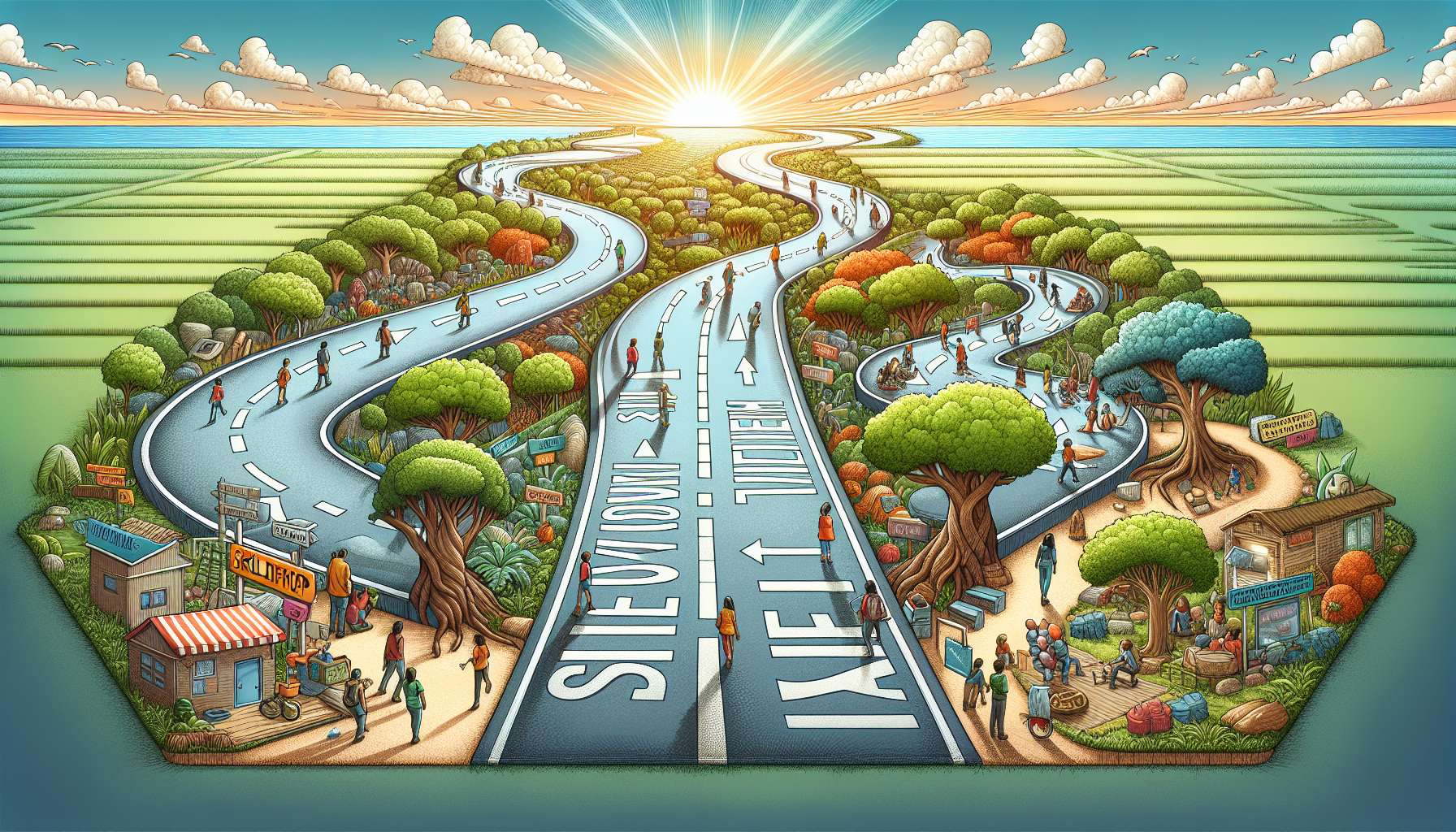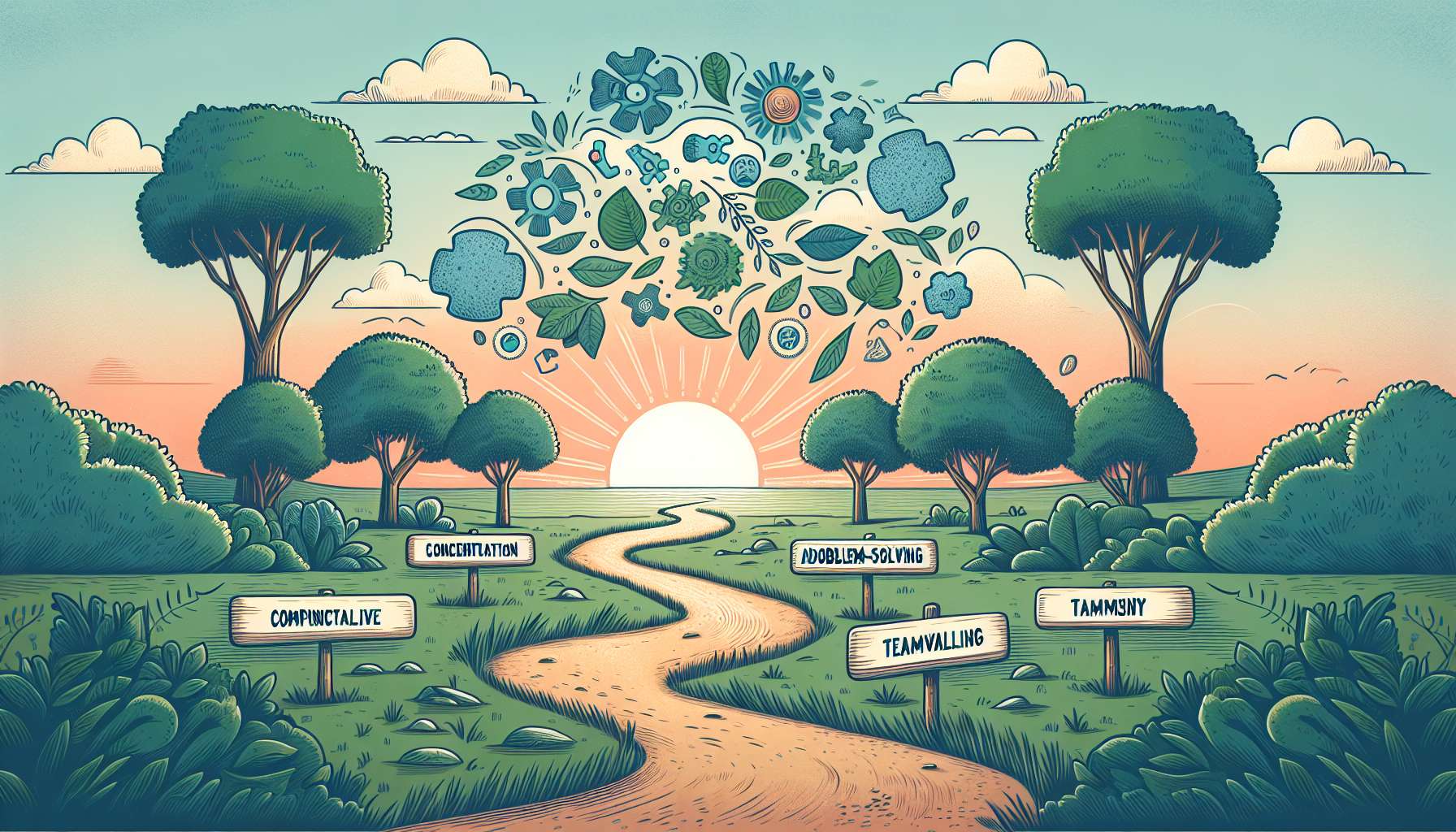Skill Development Roadmap: Navigating Your Path to Success
Skills are the building blocks of success in both personal and professional life. The ability to acquire, hone, and apply various skills is essential for achieving ones goals and aspirations. However, the journey to skill development can often seem overwhelming and daunting, especially with the ever-evolving demands of the modern world. This is where a skill development roadmap comes into play a structured plan that guides individuals in identifying, acquiring, and mastering the skills necessary to thrive in their chosen field.
Have you ever wondered how successful individuals always seem to be one step ahead, effortlessly navigating through challenges and seizing opportunities? The secret lies in their skill development roadmap a strategic blueprint that outlines the path to continuous growth and improvement. In this article, we will delve deep into the concept of skill development roadmap, exploring its significance, components, and practical applications. Lets embark on this enlightening journey together.
The Foundation of Skill Development
At the core of skill development lies the fundamental principle of lifelong learning. In todays fast-paced and dynamic world, the ability to adapt, learn new skills, and evolve with changing trends is crucial for personal and professional success. A skill development roadmap serves as a compass, guiding individuals through the vast landscape of skills they need to acquire and develop to achieve their goals.
Imagine a roadmap that outlines the key milestones, challenges, and opportunities on your journey to success. This roadmap not only helps you identify your current skill set but also highlights areas where you need to improve or acquire new skills. By following this roadmap diligently, you can enhance your capabilities, increase your market value, and stay ahead of the curve in your chosen field.
Components of a Skill Development Roadmap
A well-crafted skill development roadmap consists of several key components that work together to create a comprehensive and actionable plan for skill enhancement. Lets explore some of the essential elements that make up a successful skill development roadmap:
Self-Assessment
The first step in creating a skill development roadmap is to conduct a thorough self-assessment. This involves identifying your strengths, weaknesses, interests, and goals. By understanding your current skill set and areas for improvement, you can tailor your roadmap to focus on the skills that will have the greatest impact on your personal and professional growth.
Self-assessment can be done through various methods, such as self-reflection, feedback from peers and mentors, and formal assessments like skills assessments or personality tests. By gaining a clear understanding of your strengths and weaknesses, you can create a targeted roadmap that addresses your specific development needs.
Goal Setting
Once you have completed your self-assessment, the next step is to set specific, measurable, achievable, relevant, and time-bound (SMART) goals for skill development. These goals should be aligned with your long-term aspirations and reflect the skills you need to acquire or improve to achieve them.
Goal setting is a crucial component of a skill development roadmap, as it provides a clear direction and motivation for your learning journey. Whether your goal is to become a proficient coder, a skilled communicator, or a successful leader, setting clear and actionable goals will help you stay focused and track your progress effectively.
Skills Mapping
Skills mapping involves identifying the key skills required for success in your chosen field or industry. This step requires research and analysis to determine the technical, soft, and transferable skills that are in demand and will give you a competitive edge.
By mapping out the skills landscape of your industry, you can identify gaps in your current skill set and prioritize the skills you need to develop. This process ensures that your skill development roadmap is tailored to the specific requirements of your field, increasing your relevance and marketability.
Learning Resources
One of the critical components of a skill development roadmap is identifying the learning resources and opportunities available to you. This can include online courses, workshops, seminars, books, mentorship programs, or on-the-job training.
By exploring different learning resources, you can create a diversified and effective learning plan that caters to your learning style and preferences. Leveraging a mix of formal and informal learning opportunities will enhance your skill development journey and expose you to a wide range of perspectives and experiences.
Skills Development Plan
Based on your self-assessment, goal setting, skills mapping, and learning resources, you can now create a detailed skills development plan. This plan outlines the specific steps, timelines, and milestones for acquiring and mastering the skills identified in your roadmap.
Your skills development plan should be dynamic and adaptable, allowing for adjustments based on your progress and changing circumstances. By breaking down your goals into manageable tasks and setting deadlines for completion, you can stay on track and make steady progress towards skill mastery.
Continuous Evaluation
Lastly, a skill development roadmap should include mechanisms for continuous evaluation and feedback. Regularly assessing your progress, soliciting feedback from peers and mentors, and reflecting on your learning journey are essential for growth and improvement.
By evaluating your performance against your goals and making adjustments to your roadmap as needed, you can ensure that you are on the right path to success. Continuous evaluation allows you to stay agile and responsive to changes in your environment, keeping you ahead of the curve in your skill development journey.
Real-World Applications of Skill Development Roadmap
Now that we have explored the components of a skill development roadmap, lets take a look at how this concept is applied in real-world scenarios. From students and professionals to entrepreneurs and creatives, skill development roadmaps play a crucial role in guiding individuals towards their goals and aspirations.
Students
For students, a skill development roadmap can be instrumental in planning their academic and extracurricular activities. By identifying the skills they need to succeed in their chosen field, setting clear goals, and leveraging learning resources, students can enhance their academic performance and increase their employability.
Whether its mastering a new programming language, improving communication skills, or developing leadership abilities, students can use a skill development roadmap to prioritize their learning goals and track their progress over time. This proactive approach to skill development sets students apart from their peers and equips them with the tools they need to excel in school and beyond.
Professionals
For professionals, a skill development roadmap is essential for staying relevant and competitive in todays rapidly evolving job market. By continuously updating their skills, professionals can enhance their job performance, increase their earning potential, and unlock new career opportunities.
Whether its acquiring industry-specific certifications, attending professional development workshops, or seeking mentorship from seasoned experts, professionals can use a skill development roadmap to navigate their career path strategically. By aligning their skill development goals with their long-term career objectives, professionals can build a strong foundation for success and achieve their full potential.
Entrepreneurs
For entrepreneurs, a skill development roadmap is crucial for building a successful business and staying ahead of the competition. By identifying the key skills needed to launch and grow their venture, entrepreneurs can create a roadmap that addresses their unique challenges and opportunities.
Whether its developing marketing expertise, financial acumen, or leadership skills, entrepreneurs can leverage a skill development roadmap to strengthen their capabilities and drive business growth. This proactive approach to skill development empowers entrepreneurs to make informed decisions, adapt to changing market conditions, and achieve their entrepreneurial goals.
Creatives
For creatives, a skill development roadmap can be a valuable tool for honing their craft and expanding their creative horizons. Whether its mastering a new artistic technique, developing a unique style, or exploring new mediums, creatives can use a skill development roadmap to set creative goals and push the boundaries of their creativity.
By immersing themselves in diverse learning experiences, seeking feedback from peers and mentors, and experimenting with new ideas, creatives can unlock their full creative potential and create work that resonates with audiences. A skill development roadmap provides creatives with a structured framework for continuous growth and innovation, enabling them to thrive in the competitive world of art and design.
Expert Opinions on Skill Development Roadmap
According to renowned career coach and author, John C. Maxwell, Success is not a destination, its a journey. And the key to success lies in continuous learning and skill development. Maxwell emphasizes the importance of creating a skill development roadmap that guides individuals towards their goals and helps them navigate through challenges along the way.
Similarly, Harvard Business Review contributor, Dorie Clark, highlights the role of skill development roadmaps in fostering a culture of continuous improvement and innovation. Clark believes that organizations that prioritize skill development and create clear pathways for growth are better equipped to adapt to change and seize new opportunities in todays competitive landscape.
Common Misconceptions About Skill Development Roadmap
One common misconception about skill development roadmap is that it is a one-size-fits-all solution. In reality, a skill development roadmap should be personalized and tailored to the individuals goals, interests, and learning style. By customizing their roadmap to their specific needs, individuals can maximize their learning potential and achieve greater success in their chosen field.
Another misconception is that skill development is a one-time effort. In truth, skill development is an ongoing process that requires continuous learning, practice, and refinement. A skill development roadmap should be dynamic and adaptable, allowing individuals to adjust their goals and strategies as they progress on their learning journey.
Conclusion
As we wrap up our exploration of skill development roadmap, its clear that this strategic tool is essential for personal and professional growth. By creating a well-defined roadmap that outlines your goals, identifies key skills, and maps out a plan for development, you can navigate through challenges, seize opportunities, and achieve success in your chosen field.
Remember, skill development is a journey, not a destination. Embrace the process of continuous learning, growth, and improvement, and let your skill development roadmap be your guiding light on the path to success. Whether youre a student, a professional, an entrepreneur, or a creative, a skill development roadmap can empower you to reach your full potential and make your mark on the world.
So, what are you waiting for? Start crafting your skill development roadmap today and embark on a transformative journey towards a brighter and more prosperous future.




